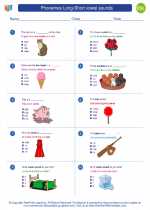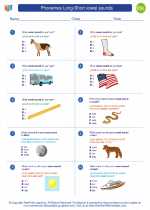Phonemes Long-Short Vowel Sounds Study Guide
Overview
In English, vowels can produce two different sounds: long and short. Long vowels are pronounced with the letter's name and short vowels are pronounced as the sound itself. Understanding the difference between long and short vowel sounds is important for reading and spelling words correctly.
Long Vowel Sounds
Long vowel sounds are produced when a vowel says its own name. For example:
- A = /ā/ as in "cake"
- E = /ē/ as in "feet"
- I = /ī/ as in "kite"
- O = /ō/ as in "go"
- U = /ū/ as in "flute"
Short Vowel Sounds
Short vowel sounds are produced with a quick, crisp sound. For example:
- A = /ă/ as in "cat"
- E = /ĕ/ as in "bed"
- I = /ĭ/ as in "sit"
- O = /ŏ/ as in "dog"
- U = /ŭ/ as in "cup"
Practice Activity
Now, let's practice identifying long and short vowel sounds in words. Look at the following words and determine if the vowel sound is long or short:
- lake - Long (the letter A says its own name)
- bed - Short (the letter E makes a quick sound)
- fight - Long (the letter I says its own name)
- hot - Short (the letter O makes a quick sound)
Conclusion
Understanding the distinction between long and short vowel sounds is crucial for developing strong reading and spelling skills. Practice identifying and pronouncing these sounds regularly to improve your language abilities.



